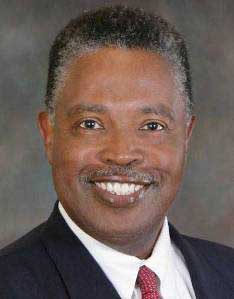 Dr. James Ewers is vice president for Student Affairs and Enrollment Management at Edward Waters College.
Dr. James Ewers is vice president for Student Affairs and Enrollment Management at Edward Waters College.My parents taught me early in life that I would not get paid for everything that I did. That series of talks and conversations really has provided me with a firm social and community foundation over the years. As a young boy, I thought that every time I would rake leaves or do something else around the neighborhood that I would receive maybe fifty cents or a dollar for my labor. I just thought that was the way of the world. In other words — I work, you pay! Those early lessons in working without pay served as the beginning of my volunteer service. As I grew older, I actually took great pride in having neighbors tell me thanks for a job well done. The thank you might be accompanied by a piece of cake or a slice of pie. So I guess when I enrolled in college being a volunteer on projects wasn’t difficult because I had some earlier experiences.
It is my view that one of today’s college students’ signature moments is when they volunteer. The concept of volunteering has been around for a long time, yet the key is to provide students with why it is important to volunteer. I don’t think that a student can just jump into volunteering. Questions abound about the types of volunteer service and what’s in it for them. These are just a few of the basic questions that must be answered before volunteer service begins.
Students, I believe, must see it as an intrinsic reward and not simply doing something without being paid for it. Students should feel as if they have contributed to the common good. Students usually will find out about opportunities to volunteer from their teachers and from various campus offices. Many colleges and universities have created offices specifically for volunteering. There are many volunteer opportunities that can be found at United Way agencies and other community-based organizations.
My advice to every college student, regardless of classification, is to go after every volunteer opportunity. When colleges have volunteer fairs students should be present and ready to sign up. These chances provide students with the opportunity to become difference-makers and become known for their caring and generous spirit. Obviously, future employers value students who have demonstrated high levels of volunteer service. Making a difference one life at a time can be a powerful way to live your life, and this can be done through volunteer service. I am sure that there are students on our campuses right now thinking about what volunteer opportunities they can find over the upcoming school breaks.
Another civic responsibility is to register to vote. Students, when they become registered, have the future of this country in their hands. While most would say that voting in the presidential election is the most important, there are also elections at the local and state level. Many years ago, baby boomers such as me did not have the chance to participate in early voting because it was not available. Of course, that has changed now, and a lot of people are taking advantage of it. People, ages 18-29, are voting in great numbers. This is according to Generation Opportunity, a nonpartisan organization that looks at trends among this age group.
One statistic generated by this organization said that 76 percent of millenials plan to vote. This is significant because it tells us that this age group cares deeply about our country. It is my view, which I believe is shared by others, that voter registration campaigns are on the rise. It is not unusual to see authorized community groups conducting voter registration efforts on college campuses. There are two main voter-related issues facing today’s college students. First, they must register to vote, and second, they must actually vote. Without voting their voices are silent.
An axiom that must be taught on every college campus is that students must give back. Lessons in the classroom and practical out-of-class experiences must teach students that giving back provides them with a moral compass. There are many residual effects of going to college. I have long held the belief that a college education teaches students to value, yet question the condition of the world. If we as members of the college community see something that is wrong and/or needs to be improved, we have an obligation to fix it. Students of today, I believe, are heeding the clarion call to challenge and improve their environment. While much has been done, there is still much work to do. They stand at the corner of hope and opportunity. The future of this country and this world rests with them. Those of us who are in education at any level must mentor more, counsel more and teach more so that students will know that being civic-minded will pay off. They cannot take their responsibility lightly because the next generation is watching them and the mantle of civic responsibility will pass to them.
Dr. James B. Ewers Jr. is vice president for Student Affairs and Enrollment Management at Edward Waters College.


















